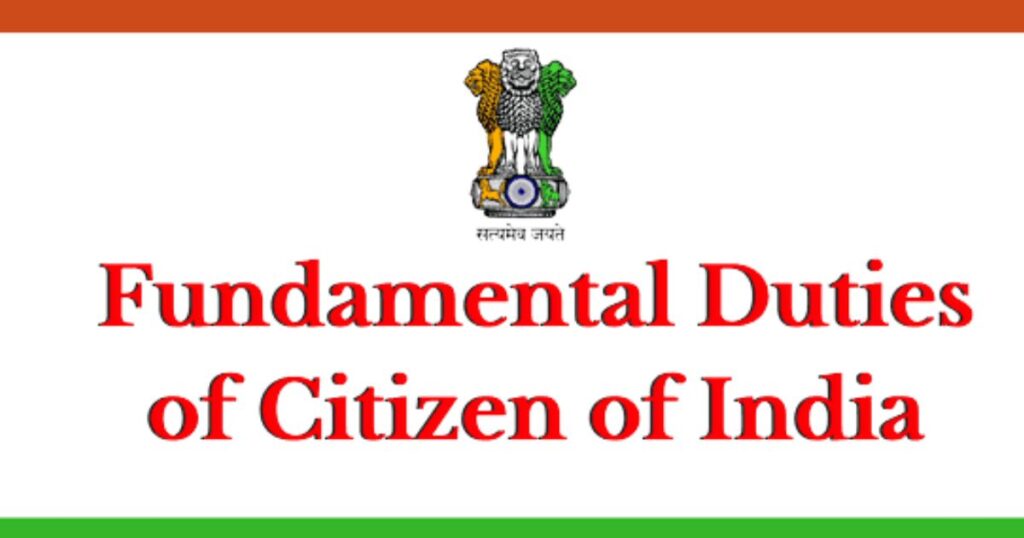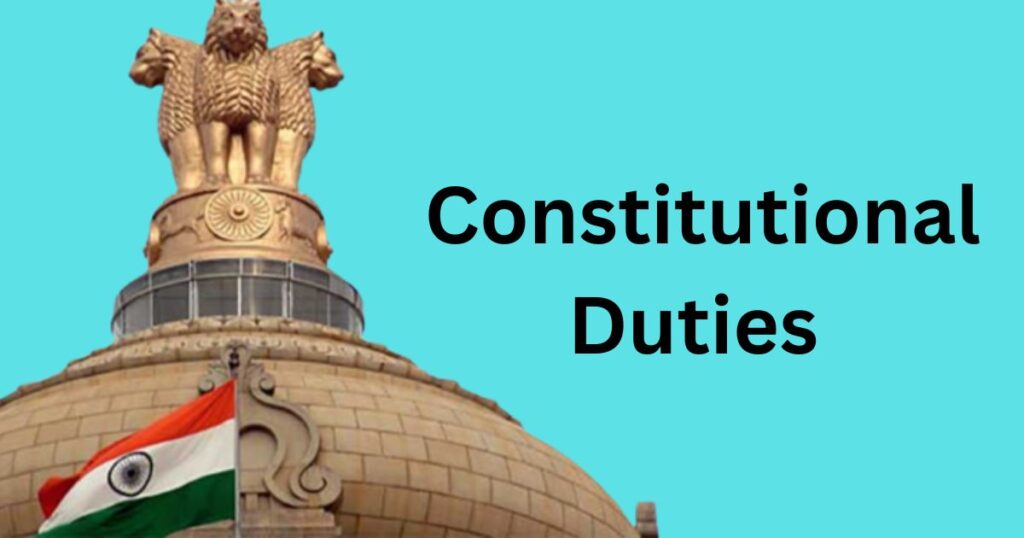The Indian Constitution not only defines the rights and freedoms of its citizens but also lays down certain duties that every citizen is expected to fulfill. These are known as Fundamental Duties, and they play a crucial role in shaping the character and responsibilities of Indians citizens towards their nation.
As a responsible citizen, it is important to understand the concept of Fundamental Duties and their implications on our lives.
Key Takeaways:
- Indian Constitution defines Fundamental Duties for every citizen.
- These duties play a crucial role in shaping the role and responsibilities of Indian citizens.
- Fundamental Duties are equally important as Fundamental Rights.
- Indian citizens are expected to fulfill certain obligations towards their nation.
- Understanding and adhering to these duties is essential for building a strong and inclusive nation.
Importance of Fundamental Duties

As an Indian citizen, you have certain responsibilities towards the nation that go beyond just exercising your voting rights. The concept of Fundamental Duties in the Indian Constitution recognizes this and outlines the fundamental obligations that every citizen must fulfill. These duties play a crucial role in promoting a sense of civic responsibility among the citizens and contribute to the overall development of the nation.
The significance of Fundamental Duties lies in their ability to provide a framework for citizens to actively participate in building a stronger and more inclusive India. By fulfilling these duties, you not only contribute to the nation’s progress but also help create a more harmonious and equitable society.
These duties are not just legal obligations but also moral and ethical responsibilities that every Indian citizen should embrace. They include respecting the national flag, upholding the sovereignty and integrity of India, and promoting harmony and the spirit of common brotherhood among all people.
By fulfilling your Fundamental Duties, you show your commitment towards the nation and contribute to its growth and prosperity. It is essential to recognize the importance of these duties and fulfill them with sincerity and dedication. By doing so, you can help build a better future for India and its citizens.
Constitutional Provisions on Fundamental Duties
The Fundamental Duties in the Indian Constitution were added by the 42nd Amendment Act in 1976 and are outlined in Part IV-A of the Constitution. These duties are considered an inherent part of the Constitution and are enforceable by law.
Article 51A of the Indian Constitution specifies 11 Fundamental Duties that Indian citizens should fulfill towards the country and society. These duties range from safeguarding public property and abiding by the Constitution to promoting harmony and striving for excellence in all fields.
| No. | Fundamental Duty |
|---|---|
| 1. | To abide by the Constitution and respect its ideals and institutions, the National Flag, and the National Anthem. |
| 2. | To cherish and follow the noble ideals that inspired the national struggle for freedom. |
| 3. | To uphold and protect the sovereignty, unity, and integrity of India. |
| 4. | To defend the country and render national service when called upon to do so. |
| 5. | To promote harmony and the spirit of common brotherhood among all the people of India, transcending religious, linguistic, and regional diversities, and to renounce practices derogatory to the dignity of women. |
| 6. | To value and preserve the rich heritage of our composite culture. |
| 7. | To protect and improve the natural environment, including forests, lakes, rivers, and wildlife, and to have compassion for living creatures. |
| 8. | To develop scientific temper, humanism, and the spirit of inquiry and reform. |
| 9. | To safeguard public property and to abjure violence. |
| 10. | To strive towards excellence in all spheres of individual and collective activity so that the nation constantly rises to higher levels of endeavor and achievement. |
| 11. | To provide opportunities for education to his child or, as the case may be, ward between the age of six and fourteen years. |
It is important to note that Fundamental Duties are not just legal obligations but also ethical and moral responsibilities as citizens towards the country and society. The Constitutional provisions on Fundamental Duties aim to promote civic responsibility, national unity, and a sense of collective consciousness among Indian citizens.
List of Fundamental Duties
The Fundamental Duties as laid out in the Indian Constitution are a crucial component of civic responsibility. As an Indian citizen, it is your duty to adhere to these obligations in order to foster a sense of social harmony and national progress. Here is a comprehensive list of the Fundamental Duties:
- To abide by the Constitution and respect its ideals and institutions, the National Flag and the National Anthem
- To cherish and follow the noble ideals which inspired India’s struggle for freedom
- To uphold and protect the sovereignty, unity and integrity of India
- To defend the country and render national service when called upon to do so
- To promote harmony and the spirit of common brotherhood amongst all the people of India transcending religious, linguistic and regional or sectional diversities; to renounce practices derogatory to the dignity of women
- To value and preserve the rich heritage of our composite culture
- To protect and improve the natural environment including forests, lakes, rivers and wildlife, and to have compassion for living creatures
- To develop the scientific temper, humanism and the spirit of inquiry and reform
- To safeguard public property and to abjure violence
- To strive towards excellence in all spheres of individual and collective activity so that the nation constantly rises to higher levels of endeavor and achievement
- To provide opportunities for education to his child or, as the case may be, ward between the age of six and fourteen years.
It is important to note that these duties are not just legal obligations but also ethical and moral responsibilities that every citizen must fulfill. By valuing and adhering to these Fundamental Duties, we can build a stronger and more inclusive India.
Constitutional Duties of Indians

As an Indian citizen, you have certain constitutional duties and responsibilities that you are expected to fulfill. These duties are outlined in Part IV-A of the Indian Constitution and are considered essential for the overall development and progress of the nation.
The Constitution of India defines the fundamental duties of citizens as those duties that must be fulfilled with a sense of commitment and patriotism towards the country. These duties are not enforceable by law, but they are morally binding for all citizens.
The constitutional duties of Indians include:
- Respecting the National Flag, National Anthem, and the Constitution of India
- Safeguarding the sovereignty, unity, and integrity of India
- Defending the country and rendering national service when called upon
- Promoting harmony and the spirit of common brotherhood among all the people of India
- Preserving the rich heritage of our composite culture
- Protecting and improving the natural environment including forests, lakes, rivers, and wildlife
- Developing a scientific temper, humanism, and the spirit of inquiry and reform
- Safeguarding public property and not engaging in violence
- Striving towards excellence in all spheres of individual and collective activity
As an Indian citizen, it is your responsibility to uphold these duties and fulfill them to the best of your ability. By doing so, you contribute to the well-being and progress of the country and help create a harmonious and inclusive society.
It is important to note that these duties are not limited to legal obligations but also encompass ethical and moral responsibilities. Therefore, it is vital to recognize that fulfilling these duties is not just a legal requirement, but also a moral obligation towards the society and the nation.
By discharging your constitutional duties, you can actively participate in the nation-building process and contribute to the overall development of the country.
Duties of Citizens: A Closer Look
As an Indian citizen, you have certain duties and responsibilities towards your country that go beyond legal obligations. These duties are outlined in the Fundamental Duties section of the Indian Constitution. Understanding and fulfilling these duties is essential for creating a strong and inclusive nation.
One of the key duties of Indian citizens is to promote harmony and the spirit of common brotherhood amongst all people of India. This means treating everyone with respect and dignity, regardless of their religion, race, caste, or gender. It also means denouncing practices that promote discrimination, violence, and hatred.
Another duty of Indian citizens is to safeguard public property and resources. This includes protecting natural resources, such as forests and water bodies, as well as public infrastructure and facilities, such as roads, schools, and hospitals. Citizens are also expected to pay their taxes honestly and on time, as this contributes to the overall development of the nation.
Indian citizens are also responsible for preserving the rich heritage and culture of India. This includes promoting and respecting the diversity of languages, traditions, and customs that exist within the country. Citizens are also expected to contribute to the development of art, literature, and science, as this helps to preserve and enrich the national identity.
Another important duty of Indian citizens is to defend the country and render national service when required. This means being willing to serve in the armed forces or in other capacities that contribute to national security and development. Citizens are also expected to be vigilant against threats to national sovereignty and integrity.
Finally, Indian citizens have a moral and ethical duty to uphold and promote the values enshrined in the Constitution, such as democracy, secularism, and social justice. This means being active participants in the democratic process, respecting the rights of others, and working towards a more equitable society for all.
Overall, the duties and responsibilities of Indian citizens are both legal and moral in nature. Fulfilling these duties is essential for promoting social harmony, national progress, and a sense of civic responsibility among all Indians.
Fundamental Rights and Duties
In the Indian Constitution, Fundamental Rights and Duties are two sides of the same coin. It is essential to understand that while every citizen has Fundamental Rights, they also come with duties and responsibilities towards the nation. The Constitution mandates that every individual must uphold these duties to maintain social harmony and promote national progress.
The Fundamental Duties enshrined in the Constitution are based on the principles of morality and ethics. These duties not only help in building a strong and inclusive nation, but they also emphasize the importance of individual responsibility towards society. It is important to note that the Constitution lays down these duties, and citizens are expected to follow them.
The Indian Constitution recognizes that Fundamental Rights and Duties are interdependent and reinforce each other. The exercise of one’s rights is subject to the performance of one’s duties. The duties of every citizen ensure that the exercise of one’s rights does not infringe upon the rights of others.
In conclusion, understanding the relationship between Fundamental Rights and Duties in the Indian Constitution is essential. While every citizen has the right to exercise their rights, it is equally important to uphold their constitutional duties towards the nation. Adhering to these duties not only ensures the protection of individual rights but also promotes harmony and progress in society.
Promoting Awareness and Adherence

As an Indian citizen, it is your constitutional duty to be aware of and fulfill your fundamental duties. While the Indian Constitution lays out these duties, it is up to each citizen to take the initiative to understand and implement them in their daily lives.
One effective way to promote awareness and adherence to these duties is through education. Schools and colleges can play a vital role in teaching students about their fundamental duties and helping them understand the importance of fulfilling them. Similarly, government agencies and NGOs can launch awareness campaigns to reach out to the general public and educate them about their duties as citizens.
Another way to encourage adherence to fundamental duties is to integrate them into various forms of civic engagement. For instance, volunteering for social causes can help citizens fulfill their duties towards promoting harmony and the spirit of common brotherhood. Other forms of civic engagement, such as participating in local governance and elections, also help citizens fulfill their constitutional duties.
Lastly, it is essential to create an environment of accountability and encourage citizens to take responsibility for their actions. By recognizing the significance of fundamental duties, citizens can contribute to building a stronger and more inclusive nation.
You Can Read: What are the Fundamental Rights in the Indian Constitution?
Conclusion
As a responsible citizen of India, it is your duty to be aware of and fulfill the Fundamental Duties outlined in the Indian Constitution. These duties play a crucial role in promoting a sense of civic responsibility and contributing to the overall development of the nation.
The Constitutional Provisions on Fundamental Duties specify the legal obligations that Indian citizens are expected to fulfill. By fulfilling these duties, you can contribute to the creation of a socially harmonious and inclusive society.
It is important to note that these duties are not limited to legal obligations. Ethical and moral responsibilities also come into play when fulfilling your duties as an Indian citizen.
The relationship between Fundamental Rights and Duties in the Indian Constitution is interconnected and mutually reinforcing. By exercising your rights responsibly, you can fulfill your duties towards your country and fellow citizens.
It is crucial to promote awareness and adherence to Fundamental Duties among Indian citizens. Strategies and initiatives should be undertaken to ensure a greater understanding and compliance with these duties.
In conclusion, being aware of and fulfilling your Fundamental Duties is essential for building a strong and inclusive India. By fulfilling your duties, you can contribute to the overall progress and development of the nation.
FAQ
Q: What are Fundamental Duties in the Indian Constitution?
A: Fundamental Duties are a set of moral obligations outlined in the Indian Constitution that every citizen of India is expected to fulfill. These duties aim to promote a sense of responsibility, respect for the country, and the overall well-being of society.
Q: Why are Fundamental Duties important?
A: Fundamental Duties are important as they contribute to the overall development and progress of the nation. They play a crucial role in fostering a sense of civic responsibility among Indian citizens and help in maintaining social harmony and unity.
Q: What are the constitutional provisions related to Fundamental Duties?
A: The Indian Constitution, under Part IV-A, Article 51A, outlines the Fundamental Duties. These duties are enforceable by law and highlight the obligations that every citizen must fulfill towards the nation.
Q: What is the list of Fundamental Duties?
A: The list of Fundamental Duties includes duties such as respecting the Constitution, cherishing the ideals of freedom fighters, promoting harmony, safeguarding public property, protecting the natural environment, and upholding the dignity of women, among others.
Q: What are the constitutional duties of Indians?
A: Indians have constitutional duties that include respecting the sovereignty and integrity of India, defending the country, promoting the spirit of brotherhood, and striving for excellence in all spheres of individual and collective activity.
Q: What do the duties of citizens entail?
A: The duties of citizens extend beyond legal obligations and encompass ethical and moral responsibilities. Citizens are expected to participate in the democratic process, preserve heritage, promote scientific temper, and contribute to the welfare of the community.
Q: How are Fundamental Rights and Duties related?
A: Fundamental Rights and Duties are interrelated concepts in the Indian Constitution. While Fundamental Rights protect the individual rights of citizens, Fundamental Duties emphasize the collective responsibilities and obligations towards the country and fellow citizens.
Q: How can awareness and adherence to duties be promoted?
A: Promoting awareness and adherence to Fundamental Duties can be achieved through education, awareness campaigns, and active participation of citizens. Efforts should be made to integrate the understanding and importance of these duties into the fabric of society.
Q: What is the conclusion on Fundamental Duties?
A: In conclusion, Fundamental Duties form an essential component of the Indian Constitution. Fulfilling these duties is crucial for building a strong and inclusive nation that values civic responsibility, promotes social harmony, and ensures the overall well-being of its citizens.











